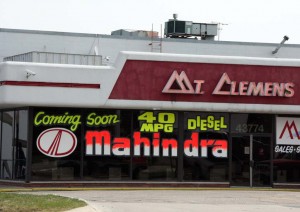
Mahindra is ramping up U.S. production of its Roxor SUV, which Fiat Chrysler is attempting to block.
Fiat Chrysler Automobiles wants the International Trade Commission to block Mahindra & Mahindra Ltd. from selling its Roxor model through the new U.S. dealership its setting up because the SUV looks too much like a Jeep.
It’s the latest in a series of battles Detroit automakers have faced, many of them in China, as they try to prevent emerging competitors from marketing knock-offs and, in some cases, even using nearly identical model and brand names.
In the case of the Roxor, FCA’s complaint to the Trade Commissions alleges the Indian SUV is “a nearly identical copy of the iconic Jeep design,” as was ‘modeled after the original Willys Jeep.”
It’s hard not to see the similarities, the Roxor adopting what FCA claims is the “boxy body shape with flat-appearing vertical sides and rear body ending at about the same height as the hood.”
(India’s Mahindra opens off-road vehicle plant near Detroit. Click Here for the story.)
It’s not the first time Jeep has wound up in an infringement case. Its parent, then known as DaimlerChrysler AG, sued crosstown rival General Motors over the design of the slat grille used for GM’s Hummer models, a design allegedly too close to that of the familiar Jeep grille.
In this case, FCA has additional reasons to worry. The Roxor is expected to come to the U.S. market at a significantly lower price than what comparable Jeep models currently go for.
Mahindra is one of India’s largest automotive manufacturers and bills itself as that country’s largest producer of SUVs. It also builds pickups as well as SUVs. It recently launched production of the Roxor at a small factory not far from FCA’s U.S. headquarters in the Detroit suburb of Auburn Hills. It is planning to invest $600 million to expand that factory and will eventually employ as many as 670 workers there.
Mahindra has also set up its own North American headquarters nearby and is currently in the process of establishing an American dealer network.
(Click Here to see what Ford and Mahindra are working on.)
The Mumbai-based automaker has faced some skepticism. With the exception of the small Ford Ecosport, Indian automotive products have never before been offered in the U.S. Complicating the challenge for Mahindra, it previously tried setting up an American retail network in 2006, announcing plans to sell both an SUV and a pickup. But that effort collapsed before distribution could begin, largely due to the American economic meltdown. The dealers the company signed up filed suit in 2012, alleging Mahindra pocketed $9.5 million they had invested for franchises.
As part of its complaint to the Trade Commission, FCA alleges that Mahindra’s “substantial foreign manufacturing capacity combined with its demonstrated intention to penetrate the United States market (will) harm FCA’s goodwill and business.”
Automakers have taken legal action to block competitors for decades, but such matters have accelerated in recent years, particularly in cases involving start-up companies in emerging markets. A decade ago, General Motors struggled to block China’s Chery from marketing the QQ, a minicar that was virtually identical to one produced by GM’s Korean subsidiary, then known as Daewoo.
Ford Motor Co. is studying its options in another matter that could pit it against one of China’s largest domestic automakers, Geely. That Chengdu-based company, parent of Sweden’s Volvo, recently launched a new brand called Lynk & Co. which, frustrated Ford officials allege, is an attempt to confuse the new luxury marque with the well-established Lincoln brand.
(FCA begins shipping Jeep Compass from India to Asian and other markets. Click Here for the story.)
In China, one executive told TheDetroitBureau.com, there is no way to block Lynk & Co. because it uses a completely different written character from Lincoln. But Ford is expected to try to block any attempt by Geely to introduce the brand under the Lynk & Co. name if it tries to enter any Western market.



Bantam, yo Bantam, where are you Bantam…